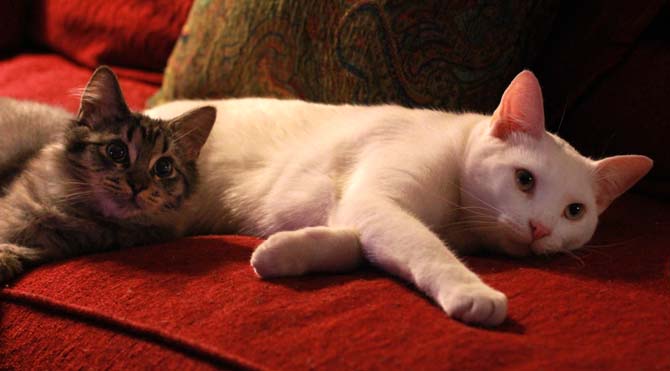With Valentine’s Day quickly approaching, lovers all over campus will be trying to outdo each other on the romance scale from one to Cupid.
Many young men and women will be wrapping up boxes of chocolates and putting cute little bows on them, while others will be secretly sliding poems into jacket pockets and purses to be found at later times. And, of course, if smiling people aren’t seen toting those lovely velvet-red roses all over campus on February 14, then Valentine’s Day just won’t be the same.
However, with all of this love blossoming like strawberry fields in mid-spring, which gender is stirring it up the most? Are women or men more romantic?
Theodore Greenstein, a professor of sociology and a specialist in family relations, said the answer is hard to pinpoint by using survey methods or statistics because of the difficulty in finding a true middle-of-the-road means of investigation.
“I can’t think of an objective way you could do that,” Greenstein said. “You might ask people about their specific partner and see whether women are more likely to judge their partner as being more romantic themselves—or are men—but my guess is that you really wouldn’t find out anything too specific.”
Greenstein said judging a person’s actions as romantic without personally knowing him or her is one of the largest problems with determining the more romantic gender. Consider someone who gives a partner either milk chocolate cherry cordials or cocoa-sprinkled truffles; the gesture is intended to be sweet, but only the person accepting the chocolates truly knows how appreciated they are and how romantic the action was.
“You have to realize that it’s probably going to be more in terms of the recipient,” Greenstein said. “You do something for a girlfriend, a significant other or a spouse and I think that it’s more important how that other person perceives that action. What one person thinks is a romantic action may not be perceived as such by the intended recipient.”
This may come as a not-so-amorous surprise to some, that the expensive box of Godiva chocolates isn’t always going to blow her away, and that neither males nor females dominate the heart-sprinkled arena of romance. Still, Greenstein explained the ways in which serious relationships have evolved over time, the now changing bonds which once held two people together and what good seems to be coming out of such transformations.
“50 or 60 years ago, probably a good majority of women got married for economic reasons,” Greenstein said. “They needed a husband who’s going to have a steady income who’s going to provide a house and support the family and so on. And as more and more women went to college and developed careers, that was increasingly not the case.”
Given that such a trend could be viewed as threatening toward long-term relationships, including marriages, Greenstein went on to describe the more golden, flip-side of the locket which foretells lasting relationships being more intensely loving.
“To me what this suggests is — and this is just a hypothesis — that with the economic part of [a relationship] becoming less and less important, my guess is the romantic part is going to get to be more important,” Greenstein said.
Furthermore, students among the University tend to agree with the professional viewpoint that gauging which gender is most romantic is simply too complicated.
Though Chandler Maness, a freshman in chemical engineering, initially favored the ladies, he then considered the hopeless, romantic gentlemen who memorize sonnets to woo their objects of affection.
“Most of the time I would say women are more romantic than men,” Maness said, but he then acknowledged the topic’s subjectivity. “Women are more romantic than me, but [as for others] I guess it just depends on your personality.”
Amanda Eads, a junior in English and Middle Eastern studies, shared Maness’s opinion that the issue lies in a gray area, but she also contributed her thoughts on what it means to be romantic.
“I think the more thoughtful you are, and a lot of times how creative you are, plays in to it,” Eads said. “Going on a thoughtful date, or making a gift versus just going out and buying something, or even if it’s something they said, can play into it.”
Perhaps, then, for this Valentine’s Day, the moral of the story is not that one gender is more romantic than the other, but that the need for that good ‘ole heartfelt romance is on the rise.


